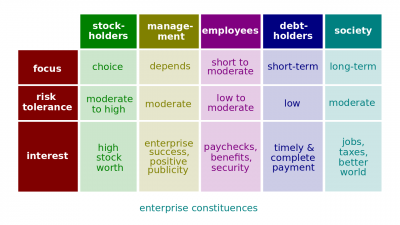Difference between revisions of "Stockholder"
(Created page with "Stockholder is any owner of the stock of the corporation. ==Definitions== According to College Accounting: A Practical Approach by Slater (13th edition), :Stock...") |
|||
| (One intermediate revision by the same user not shown) | |||
| Line 1: | Line 1: | ||
| − | [[Stockholder]] is any owner of the stock of the corporation. | + | [[File:Enterprise-constituencies.png|400px|thumb|right|[[Enterprise constituency]]]][[Stockholder]] is any owner of the stock of the corporation. |
| Line 9: | Line 9: | ||
*[[Accounting]] (alternatively known as [[accountancy]]) is management of [[financial data]], information, and knowledge about [[financial transaction]]s of [[legal entity|legal entiti]]es. [[Accountancy]] tends to include [[bookkeeping]] and, depending on a particilar enterprise, may also include [[quatitative analysis]] of [[financial data]] in the [[bookkeeping system]] and/or [[business intelligence]]. | *[[Accounting]] (alternatively known as [[accountancy]]) is management of [[financial data]], information, and knowledge about [[financial transaction]]s of [[legal entity|legal entiti]]es. [[Accountancy]] tends to include [[bookkeeping]] and, depending on a particilar enterprise, may also include [[quatitative analysis]] of [[financial data]] in the [[bookkeeping system]] and/or [[business intelligence]]. | ||
| − | ==Related | + | ==Related lectures== |
*[[Corporate Accounting]]. | *[[Corporate Accounting]]. | ||
| − | [[Category: Accounting]][[Category: Articles]] | + | [[Category: American Accounting]][[Category: Articles]] |
Latest revision as of 23:58, 3 November 2019
Stockholder is any owner of the stock of the corporation.
Definitions
According to College Accounting: A Practical Approach by Slater (13th edition),
- Stockholder. An owner of the stock of the corporation.
Related concepts
- Accounting (alternatively known as accountancy) is management of financial data, information, and knowledge about financial transactions of legal entities. Accountancy tends to include bookkeeping and, depending on a particilar enterprise, may also include quatitative analysis of financial data in the bookkeeping system and/or business intelligence.
